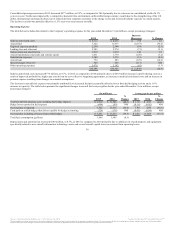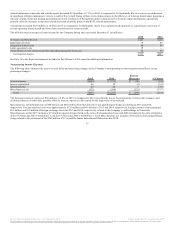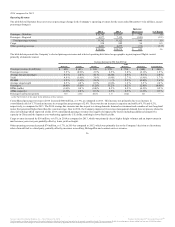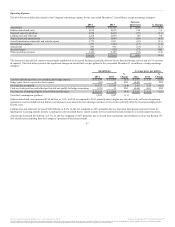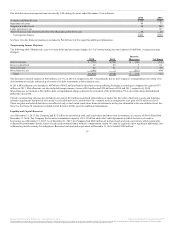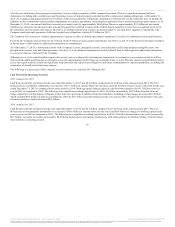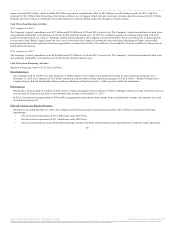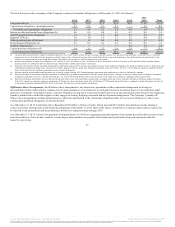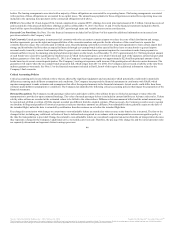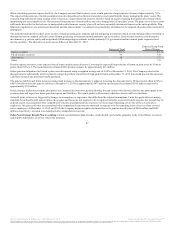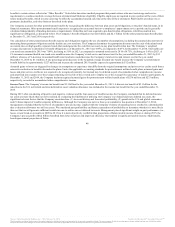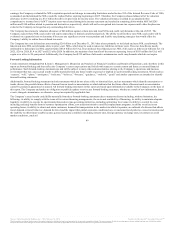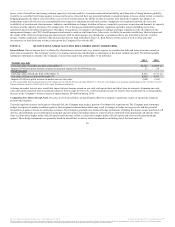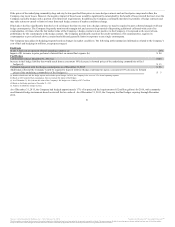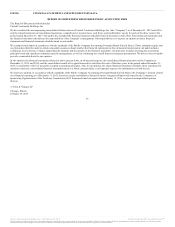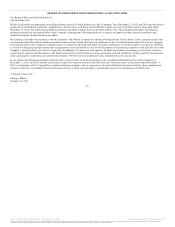United Airlines 2015 Annual Report Download - page 45
Download and view the complete annual report
Please find page 45 of the 2015 United Airlines annual report below. You can navigate through the pages in the report by either clicking on the pages listed below, or by using the keyword search tool below to find specific information within the annual report.
bodies. The leasing arrangements associated with a majority of these obligations are accounted for as operating leases. The leasing arrangements associated
with a portion of these obligations are accounted for as capital leases. The annual lease payments for those obligations accounted for as operating leases are
included in the operating lease payments in the contractual obligations table above.
EETCs. In November 2015 and August 2014, United completed two separate EETC offerings for a total principal amount of $1.5 billion. United has received
and recorded all of the proceeds from these offerings as debt as of December 31, 2015. See Notes 11 and 14 to the financial statements included in Part II,
Item 8 of this report for additional information on EETC pass-through trusts and variable interest entity consideration.
Increased Cost Provisions. See Note 15 to the financial statements included in Part II, Item 8 of this report for additional information on increased cost
provisions related to the Company’s debt.
Fuel Consortia. United participates in numerous fuel consortia with other air carriers at major airports to reduce the costs of fuel distribution and storage.
Interline agreements govern the rights and responsibilities of the consortia members and provide for the allocation of the overall costs to operate the
consortia based on usage. The consortia (and in limited cases, the participating carriers) have entered into long-term agreements to lease certain airport fuel
storage and distribution facilities that are typically financed through tax-exempt bonds (either special facilities lease revenue bonds or general airport
revenue bonds), issued by various local municipalities. In general, each consortium lease agreement requires the consortium to make lease payments in
amounts sufficient to pay the maturing principal and interest payments on the bonds. As of December 31, 2015, approximately $1.3 billion principal amount
of such bonds were secured by significant fuel facility leases in which United participates, as to which United and each of the signatory airlines has provided
indirect guarantees of the debt. As of December 31, 2015, the Company’s contingent exposure was approximately $224 million principal amount of such
bonds based on its recent consortia participation. The Company’s contingent exposure could increase if the participation of other air carriers decreases. The
guarantees will expire when the tax-exempt bonds are paid in full, which ranges from 2017 to 2041. The Company did not record a liability at the time these
indirect guarantees were made. See Note 15 to the financial statements included in Part II, Item 8 of this report for additional information related to the
Company’s fuel consortia.
Critical accounting policies are defined as those that are affected by significant judgments and uncertainties which potentially could result in materially
different accounting under different assumptions and conditions. The Company has prepared the financial statements in conformity with GAAP, which
requires management to make estimates and assumptions that affect the reported amounts in the financial statements. Actual results could differ from those
estimates under different assumptions or conditions. The Company has identified the following critical accounting policies that impact the preparation of the
financial statements.
Revenue Recognition. The Company records passenger ticket sales and tickets sold by other airlines for use on United as passenger revenue when the
transportation is provided or upon estimated breakage. The value of unused passenger tickets is included in current liabilities as Advance ticket sales. Tickets
sold by other airlines are recorded at the estimated values to be billed to the other airlines. Differences between amounts billed and the actual amounts may
be rejected and rebilled or written off if the amount recorded was different from the original estimate. When necessary, the Company records a reserve against
our interline billings and payables if historical experience indicates that these amounts are different. Non-refundable tickets generally expire on the date of
the intended flight, unless the date is extended by notification from the customer on or before the intended flight date.
Fees charged in association with changes or extensions to non-refundable tickets are recorded as other revenue at the time the fee is incurred. The fare on the
changed ticket, including any additional collection of fare, is deferred and recognized in accordance with our transportation revenue recognition policy at
the time the transportation is provided. Change fees related to non-refundable tickets are considered a separate transaction from the air transportation because
they represent a charge for the Company’s additional service to modify a previous sale. Therefore, the pricing of the change fee and the initial customer order
are separately determined and represent distinct earnings processes.
44
Source: United Continental Holdings, Inc., 10-K, February 18, 2016 Powered by Morningstar® Document Research℠
The information contained herein may not be copied, adapted or distributed and is not warranted to be accurate, complete or timely. The user assumes all risks for any damages or losses arising from any use of this information,
except to the extent such damages or losses cannot be limited or excluded by applicable law. Past financial performance is no guarantee of future results.


